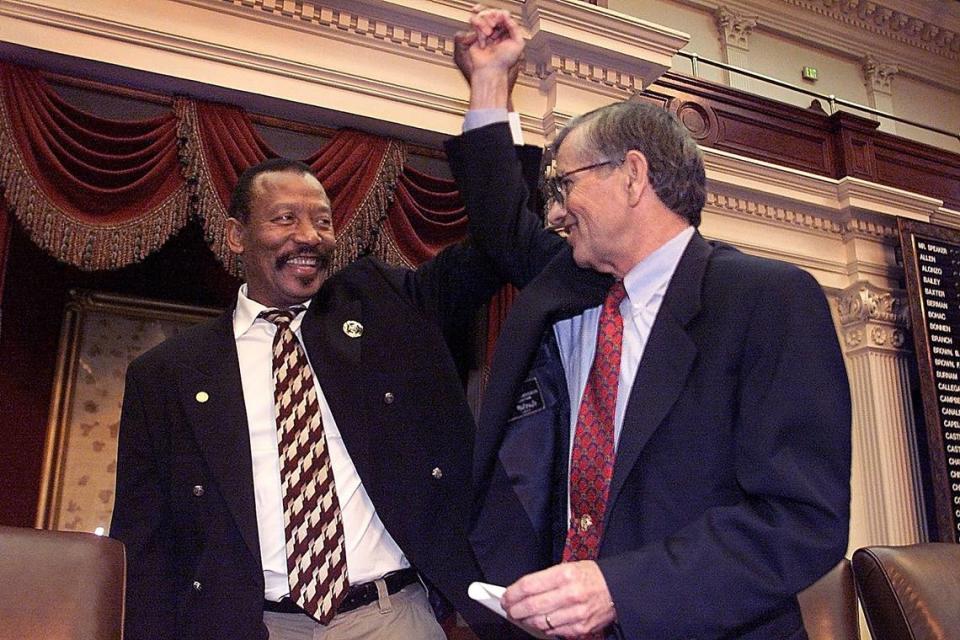Texas tried a ‘booty bill,’ and it didn’t go well. Now, the target is drag shows | Opinion
The last time the Legislature was all riled up about sexually suggestive dancing and other performances, it was about cheerleaders.
High school cheerleaders, that is.
In 2005, Houston Rep. Al Edwards, one of the Capitol’s all-time characters, made it a crusade to curtail what he called cheer and dance squads “shaking their behinds and going on, breaking it down.” The national attention from late-night comedians was merciless, but Edwards’ “booty bill” made it through the House.
All this came to mind as the Legislature debates new restrictions on businesses that host performances containing “sexual conduct” — a broad enough term, but clearly an attempt to prevent minors from attending drag shows.
In fact, the Senate approved a bill that would let authorities crack down on a business if minors attended “a male performer exhibiting as a female, or a female performer exhibiting as a male, who uses clothing, makeup, or other similar physical markers and who sings, lip syncs, dances, or otherwise performs before an audience.”
The bill set off alarm bells in a House committee for that and other reasons, including concerns that even the Dallas Cowboys cheerleaders might be affected. Cooler heads prevailed, and the version that lawmakers are set to consider Friday no longer expressly targets drag performers.
Still, it’s part of a much wider discussion in Texas and other parts of the nation about gender and exposing children to anything related to sex. Enough videos of kids putting dollars in G strings have emerged online to alarm cultural conservatives, who’ve demanded action.
Even if it’s relatively rare, most of us can probably agree that children shouldn’t be at such performances. But legislating against that level of bad parenting is hard. The Senate couldn’t or wouldn’t do it without blatantly discriminating.
What this year’s drag drama and 2005’s cheerleader chase have in common is a key enemy of good lawmaking: vagueness.
In both situations, legislators struggled to define exactly what’s problematic and how on earth such definitions would be enforced. Edwards’ bill said only that “overtly sexually suggestive” cheer or dance routines were the problem. We all sort of nod and agree with the old saw about knowing obscenity when we see it, but who gets to decide what gets a business or school district fined?
This year’s bill tries to get around that with a list of specific sex acts that would be included if a performer represented them. I’d quote it, but the Legislature is a bit more vulgar than the Star-Telegram.
Now, none of this means lawmakers should throw up their hands because it’s just too hard. It means they should be thoughtful, listen carefully and be humble about how much they can control.
Legislating the culture is hard. Laws didn’t get us to a place where a small number of parents think it’s cute to give a kid a buck and point them to a half-naked performer.

It didn’t work out for Al Edwards. He lost his seat in the Democratic primary the following year, although that was more about the fact that he aligned himself with Speaker Tom Craddick, the first Republican to lead the House in more than a century.
Edwards, who died in 2020, deserves to be remembered for much more than his concerns about cheerleaders. He led the charge to make Juneteenth a state holiday, long before there was much recognition of it. He spent decades standing up for Black civil-rights and other causes.
And his cheerleading bill got further than anyone thought in 2005. Once it landed in the Senate, where it died without even a committee hearing, one of the leading objections stands as a reminder that history has one heckuva sense of humor.
Tarrant County Republican Sen. Kim Brimer said his wife urged him to support Edwards’ bill, according to Star-Telegram coverage at the time. But Brimer was thinking ahead to a new constituent about to arrive in his district.
“I told her we had the Dallas Cowboy cheerleaders coming to Arlington,” he said. “I’m not going to offend the Cowboys in any way.”

